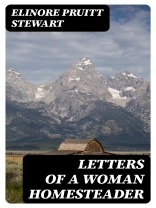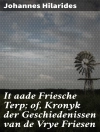In ‘Letters of a Woman Homesteader, ‘ Elinore Pruitt Stewart presents a captivating collection of letters that vividly recounts her experiences as a homesteader in the early 20th century American West. Through her engaging narrative style, Stewart masterfully blends personal anecdotes with a broader commentary on the struggles and triumphs of women in a predominantly male-dominated frontier society. The letters, written with genuine emotion and keen observation, capture not only the harsh realities of rural life but also the indomitable spirit of resilience and self-discovery that defined this era. Stewart’s work stands as an essential document of the American literary landscape, contributing to the canon of Western literature while offering an authentic female perspective often overlooked in historical records. Elinore Pruitt Stewart, born in 1871 in Kansas, embraced the challenges of homesteading with remarkable courage and insight, drawing upon her own life experiences as a single mother and pioneer. Her journey to Wyoming led her to uncover the nuances of community, labor, and identity amidst a backdrop of breathtaking landscapes and societal expectations. Stewart’s writings reflect her deep appreciation of the natural world and her commitment to carving out a space for women in history, making her a significant voice in early American literature. This book is a heartfelt invitation for readers to explore the untold narratives of women pioneers. Stewart’s eloquent prose and vivid descriptions resonate with contemporary themes of empowerment and individuality, making this collection not only an enlightening historical account but also an inspiring read for anyone interested in the complexities of human experience against the backdrop of the American frontier.
Об авторе
Elinore Pruitt Stewart (1876–1933) was an American homesteader and writer whose epistolary chronicle of her adventures as a pioneer in the early 20th century provides a compelling portrait of a woman’s life on the American frontier. Born Elinore Pruitt in Chickasaw Nation, Indian Territory, which is now part of Oklahoma, Stewart embarked on her journey to Wyoming as a widow with a young daughter in 1909, seeking to establish a new life. In her most famous work, ‘Letters of a Woman Homesteader’ (1914), she recounts with wit and unabashed zest the experiences and challenges she faced in staking her claim and building a homestead near Burntfork, Wyoming. Stewart’s letters, originally written to a former employer, capture the resilience and pioneering spirit of the era with vivid descriptions of the landscape, the robust community of settlers, and the joys and hardships of rural life. Her writing exhibits qualities of honesty, humor, and an indomitable spirit, making it an enduring contribution to American autobiographical literature and a valuable account of Western Americana. Through her letters, Stewart not only provided a woman’s perspective on homesteading but also documented the social and cultural aspects of the time. The collection of Stewart’s letters offers a rare glimpse into the domestic and social rituals of homesteaders, and she remains celebrated for her observational skills and for her ability to convey the pioneering experience with a compelling narrative voice.












